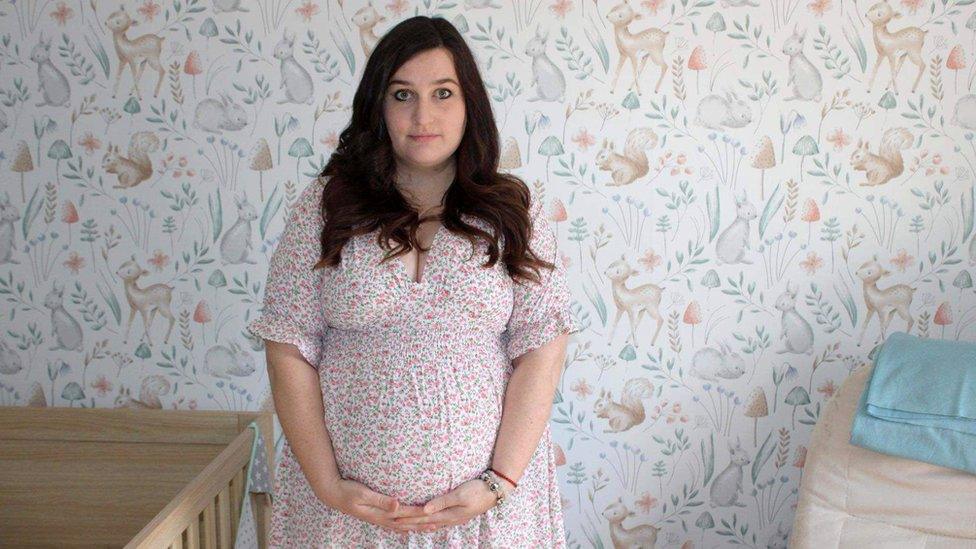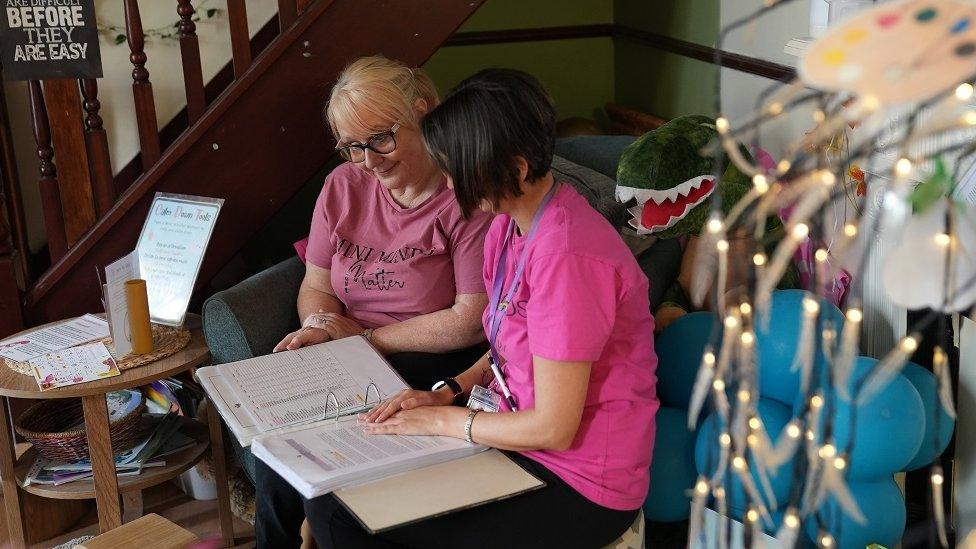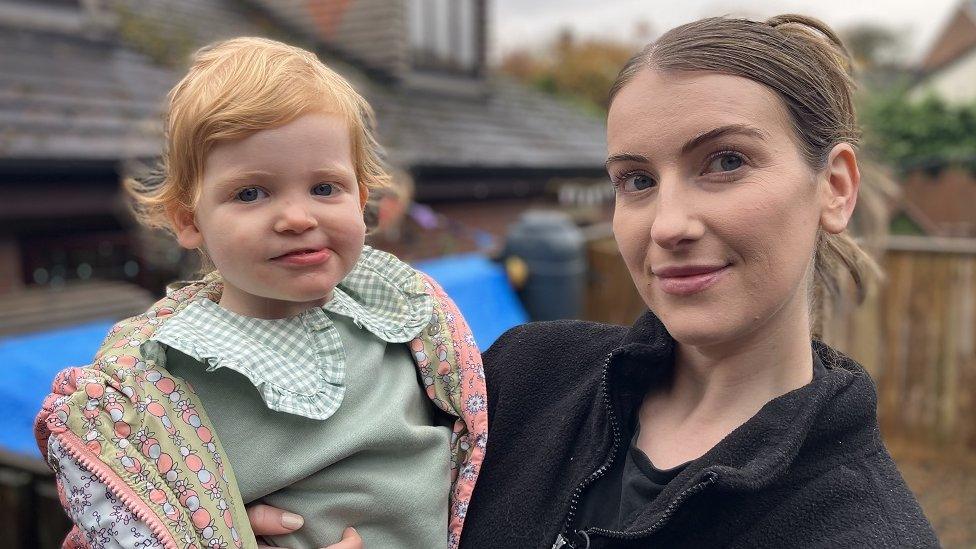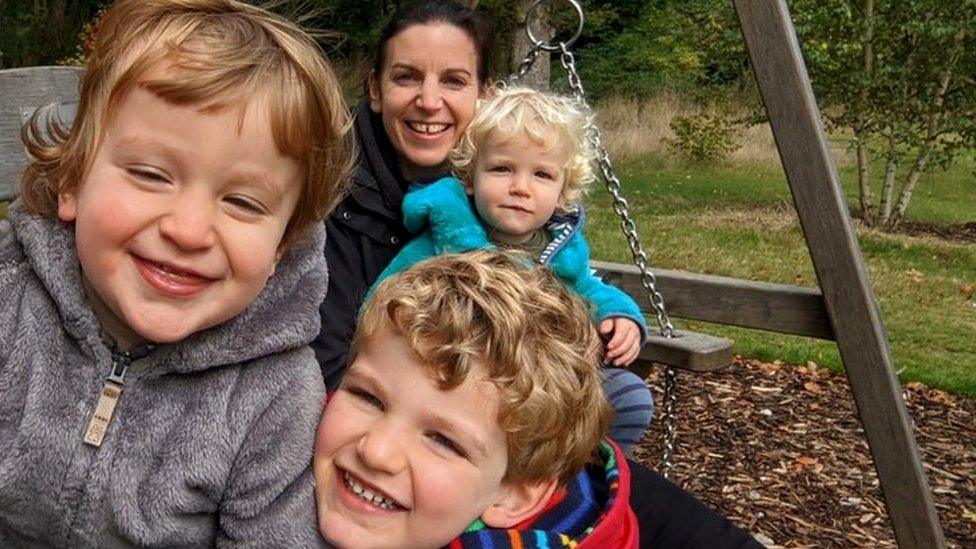Childcare: Mum-to-be given two-year wait as demand rises
- Published

There is a long waiting list at Jasmine Johnson's nearest nursery, so her child will miss out on funded childcare hours
Jasmine Johnson thought she was planning ahead when she rang her local nursery at 20 weeks pregnant to arrange a place for her baby - only to be told it was full until September 2025.
Her baby will be almost two years old before a place becomes available - and Jasmine will miss out on the first year's worth of funded childcare for which she is eligible.
Experts are warning nurseries and childminder places are becoming even harder to find for parents because of the plan to expand government-funded childcare hours for working parents in England over the next two years.
BBC News analysis estimates demand is likely to rise by about 15% - equivalent to more than 100,000 additional children in full-time care.
Jasmine, a primary-school teacher from a village with just one nursery, hoped to return to work in September 2024 but says she now has "no other choice" but to ask her parents for help and apply for reduced hours at work.
If her application for flexible working is refused, she will have to resign from her job.
"When the announcement [of the increase in funded hours] happened, I thought, 'This is brilliant timing for me and will help me get back to work,'" Jasmine says. But the situation now is making her "anxious even thinking about it".
Parents of three- and four-year-olds are currently entitled to 30 hours per week of funded childcare for 38 weeks of the year (during school term time).
By September 2025, that offer, sometimes known as "free" hours, will be extended to all pre-school children aged nine months to two years.
The Department for Education (DfE) says childminders and nurseries have "time to prepare", because the increase in funded hours is being rolled out in stages.

Eagley School House Nurseries, in Bolton, is full until 2025 - but if the new scheme is not properly funded, the nursery says, it will not survive
Thousands of parents are anxiously awaiting the expansion of funded hours, so they can increase the hours they work, according to Pregnant Then Screwed founder Joeli Brearley.
But she now fears what had seemed like a positive development for parents will result in "incredibly long waiting lists and even more uncertainty".

How much will demand increase?
A 15% increase in childcare usage in England works out at more than four million hours a week, BBC News analysis estimates, the equivalent of more than 100,000 extra children in childcare for 40 hours a week.
And this is before any parents not currently working find a job - one of the main reasons the government is taking on the cost of funding childcare.
Gillian Paull, from Frontier Economics, says the increase is likely to be "challenging", as providers face financial strains and difficulty recruiting staff, "but not infeasible".
"Even if there is unmet demand for places, many working parents will see substantial financial benefits from lower childcare costs," she says. "And if the expansion encourages more mothers with young children to work, it would be another small step towards greater gender equality."
Scotland, external, Wales , externaland Northern Ireland, external also offer some government-funded hours to working parents but different schemes are available in each nation.

At Eagley School House Nurseries, in Bolton, many parents who will be eligible for the additional funded hours are already putting requests in for extra days. But with a waiting list until March 2025, the nursery is having to say no to anyone asking for additional hours - even its own staff.
Sophie Eckersley, 31, who works at the nursery part-time and is taking her final university exams this year, was hoping to increase her two-year-old daughter's hours in April.
Having some government-funded childcare will help a lot "especially moneywise", Sophie says, but her boss, nursery owner Julie Robinson, is finding it challenging trying to fulfil parents' requests for extra hours.
"We just don't have the places," Julie says.

Nursery worker Sophie Eckersley cannot extend her two-year-old's hours from April, as the nursery is full
Neil Leitch, from the Early Years Alliance, says the BBC News analysis shows the expansion is set to be "wholly undeliverable in practice".
Some providers will have to limit the funded places they are able to offer and others will "opt out" completely, unless there is "adequate support, and crucially, increased funding".
For the sector to expand, it also needs to overcome its biggest challenge - staffing.
There were 9,800 fewer people working in childcare in 2022 than in 2019, with the number of childminders down by more than a fifth.

Busy Bees, the UK's largest nursery provider, is hoping to recruit 1,500 apprentices over the next two years
Nursery provider Busy Bees, which looks after 40,000 children, is already training 1,300 apprentices but will need more.
"We need to recruit an additional 1,500 people to meet that demand in two years' time," European Chief Executive Chris McCandless says.
He welcomes the investment the government is putting forward to help parents but says it "needs to cover the cost of childcare". And parents should put their names down fast, as places "will be hard to come by in the future".

Olivia Thomas, 16, from Lichfield, Staffordshire, received her GCSE results in August and started her Busy Bees apprenticeship in September
Earlier this year, the charity Coram found a drop in childcare availability across England, with only half of local areas having enough available spaces for children under the age of two.
Councils are in charge of monitoring whether there is enough childcare provision across their borough, as well as distributing the funding to nurseries and childminders on behalf of the government.
Louise Gittins, who chairs the Local Government Association's (LGA) Children and Young People Board, says provision is already insufficient , particularly "in deprived areas and in rural areas", and is concerned "there is a relatively short amount of time" to get everything ready before the rollout.
"We can't control new providers coming into areas that already have sufficient provision," she says. "And then other areas not having enough provision will create a system of inequality - and parents will be disappointed."
Some fear it could also put extra pressure on parents of children with special educational needs and disabilities (SEND) finding suitable places, which is already difficult.
"Historically, each time such a change has been made, it has led to a decrease in provision for children with SEND," Dingley's Promise chief executive Catherine McLeod says.
A DfE official said the department was delivering "the single biggest investment in childcare in England's history... backed by £8bn a year once fully rolled out".
The government said it was "already investing hundreds of millions of pounds to increase hourly funding rates" and would allocate £100m in capital funding for more early-years and wraparound places and spaces, with a nationwide recruitment campaign "in the new year".

About the data
BBC News used data from the government's Family Resources Survey to work out eligibility based on the age of the children and whether their parents were already working and earning the equivalent of at least 16 hours a week at the national minimum wage.
Then, we used the government's own estimates of take-up, external to estimate how many more hours a week parents were likely to use once funded childcare expanded.
By using the survey data, we were able to estimate usage on a child-by-child basis.
We calculated the increase based on hours used, rather than the number of places, because different families will use a different amount of childcare.

You might also like:


Are you pregnant and on a waiting list? Are you unable to increase your nursery hours for your toddler? Are you having to travel long distances for childcare? Share your experiences by emailing haveyoursay@bbc.co.uk, external.
Please include a contact number if you are willing to speak to a BBC journalist. You can also get in touch in the following ways:
WhatsApp: +44 7756 165803
Tweet: @BBC_HaveYourSay, external
Please read our terms & conditions and privacy policy
If you are reading this page and can't see the form you will need to visit the mobile version of the BBC website to submit your question or comment or you can email us at HaveYourSay@bbc.co.uk, external. Please include your name, age and location with any submission.
Related topics
- Published23 July 2023

- Published26 July 2023

- Published9 March 2023

